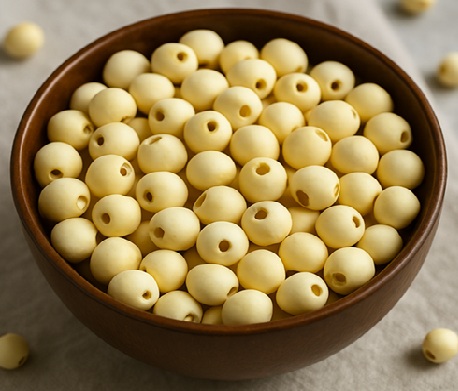Lotus Seed

Lotus Seeds (Lian Zi): A Calming Herb for Digestion, Sleep, and Vitality
Introduction
Lotus seeds, known as Lian Zi (莲子) in Traditional Chinese Medicine (TCM), have been used for centuries as a nourishing food and gentle herbal remedy. Valued for both their culinary versatility and medicinal benefits, lotus seeds are especially prized for their ability to support digestion, calm the mind, and strengthen the body. Today, they are commonly used in herbal soups, tonics, and even desserts, offering a mild, sweet flavor along with a wealth of health benefits.
What Are Lotus Seeds?
Lotus seeds come from the seed pod of the lotus flower (Nelumbo nucifera), a sacred aquatic plant native to Asia. In TCM, they are considered both a food and an herb that tonifies the Spleen, Kidneys, and Heart. The seeds are typically dried and sold with or without the bitter green sprout inside. They can be simmered, boiled, or ground into powder for a variety of traditional dishes and decoctions.
Health Benefits of Lotus Seeds
1. Supports Digestion and Stops Diarrhea
Lotus seeds are often used to strengthen the Spleen and stop chronic diarrhea or loose stools. They are especially helpful for people with weak digestion or frequent bloating.
2. Nourishes the Kidneys and Reproductive System
In TCM, lotus seeds are known to tonify the Kidneys, which are believed to govern reproductive health and aging. They are often included in formulas to support fertility, sexual vitality, and bladder control.
3. Calms the Mind and Promotes Better Sleep
The calming properties of lotus seeds help reduce restlessness and anxiety. They are often used to ease insomnia and improve sleep quality, particularly when stress or overthinking is involved.
4. Strengthens the Heart and Circulatory Health
Lotus seeds help nourish the Heart and promote emotional balance. They are thought to stabilize mood and reduce palpitations or nervous tension.
5. Gentle and Safe for All Ages
Mild in nature, lotus seeds are safe for children, the elderly, and pregnant women when used in food-like doses. They are often included in postpartum and convalescent diets to rebuild strength.
How to Use Lotus Seeds
In Soups
Lotus seeds are often simmered in nourishing soups with ingredients like red dates, goji berries, Chinese yam, or pork ribs.
Add 10–20 soaked lotus seeds to your soup and simmer for at least 1–2 hours.
Remove any green sprouts before cooking to reduce bitterness.
In Sweet Herbal Tonics or Desserts
Lotus seeds are a common ingredient in traditional Chinese desserts, such as sweet soups (tong sui) or mooncake fillings.
Boil soaked seeds until soft, then sweeten with rock sugar, red beans, or longan fruit.
In Powder or Capsule Form
Lotus seed powder is available in supplement or instant drink form. Choose a product with minimal additives and clear sourcing.
Where to Buy Lotus Seeds
You can purchase lotus seeds in:
- Chinese grocery stores
- Herbal shops
- Health food stores
- Online retailers like Amazon, iHerb, or specialty TCM sites
Look for:
- Dried white lotus seeds (hulled and split, with sprout removed)
- Whole lotus seeds (for richer, denser soups)
- Organic or pesticide-free options when available
Are There Any Side Effects?
Lotus seeds are very gentle and generally safe. However, excessive intake may cause constipation in some people due to their astringent nature. As always, pregnant women or those with serious digestive issues should consult a qualified healthcare provider before taking lotus seeds medicinally.
Conclusion
Lotus seeds are a time-honored herb and superfood that support digestion, calm the spirit, and nourish the body. Their versatility in both savory and sweet preparations makes them a favorite in traditional wellness recipes. Whether in soup, dessert, or supplement form, Lian Zi is a delicious and restorative addition to your herbal kitchen.
FAQs
Q: Can I eat lotus seeds every day?
A: Yes, lotus seeds are safe for daily use in moderate amounts, especially when used in cooking.
Q: What do lotus seeds taste like?
A: They have a mild, slightly nutty flavor with a soft, creamy texture when cooked. Removing the bitter green sprout improves the taste.
Q: Are lotus seeds safe for children?
A: Yes, lotus seeds are commonly included in children’s food in East Asia. They are gentle and nutritious, but always check with a healthcare provider for therapeutic use.

